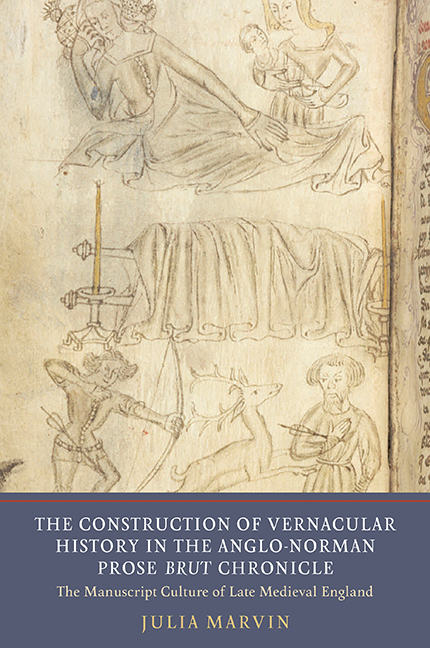 The Construction of Vernacular History in the Anglo-Norman Prose Brut Chronicle
The Construction of Vernacular History in the Anglo-Norman Prose Brut Chronicle from Part II - Reconstruction and Response
Published online by Cambridge University Press: 01 February 2018
Produced in Britain from the early fourteenth to the late fifteenth centuries, and on the Continent during the later fifteenth century, the surviving corpus of more than fifty Anglo-Norman prose Brut manuscripts clearly served a variety of audiences, both before and after its Long Version was translated into English. Extant manuscripts range widely in script, context, and size: the smallest, Add. 35092, a nicely produced later fourteenth century copy of the Oldest Version, could fit in a pocket, while the largest, Paris, Bibliothèque Sainte-Geneviève (hereafter BSG) 935, a lavish fifteenth-century Continental text with a program of illustrations, would require a support of some sort to be read. Some manuscripts are the work of many hands; some seem likely to have been written entirely by one person, in some haste, perhaps for personal use. It would do violence to the tradition to try to identify one kind of Anglo- Norman prose Brut, or one course of production, as normative.
The manuscripts themselves provide little information as to their origin and early provenance – another factor that may have contributed to neglect of the corpus, since manuscripts with identifiable origins often attract more scholarly attention. When present at all, the earliest inscriptions of ownership tend to begin with very late fifteenth century and sixteenth century owners. Especially in the earlier manuscripts, less formal, more documentary scripts are common: the Anglo-Norman prose Brut bears witness to the rise of highly current scripts, as well as other economizing measures, in fourteenth-century bookwriting. How, by whom, where, and in how organized a way the Anglo- Norman texts were produced remains an open question.
Mooney and Matheson have found evidence for the existence of a fifteenthcentury secular work-group responsible for the production of multiple copies of the Middle English prose Brut from a single exemplar, possibly mass-producing an extremely popular text on spec rather than awaiting a commission. Although their findings so far apply to only a handful of the extant manuscripts of the English Brut, they are a reminder of just how much stands to be learned through deeper study of the corpus.
To save this book to your Kindle, first ensure no-reply@cambridge.org is added to your Approved Personal Document E-mail List under your Personal Document Settings on the Manage Your Content and Devices page of your Amazon account. Then enter the ‘name’ part of your Kindle email address below. Find out more about saving to your Kindle.
Note you can select to save to either the @free.kindle.com or @kindle.com variations. ‘@free.kindle.com’ emails are free but can only be saved to your device when it is connected to wi-fi. ‘@kindle.com’ emails can be delivered even when you are not connected to wi-fi, but note that service fees apply.
Find out more about the Kindle Personal Document Service.
To save content items to your account, please confirm that you agree to abide by our usage policies. If this is the first time you use this feature, you will be asked to authorise Cambridge Core to connect with your account. Find out more about saving content to Dropbox.
To save content items to your account, please confirm that you agree to abide by our usage policies. If this is the first time you use this feature, you will be asked to authorise Cambridge Core to connect with your account. Find out more about saving content to Google Drive.